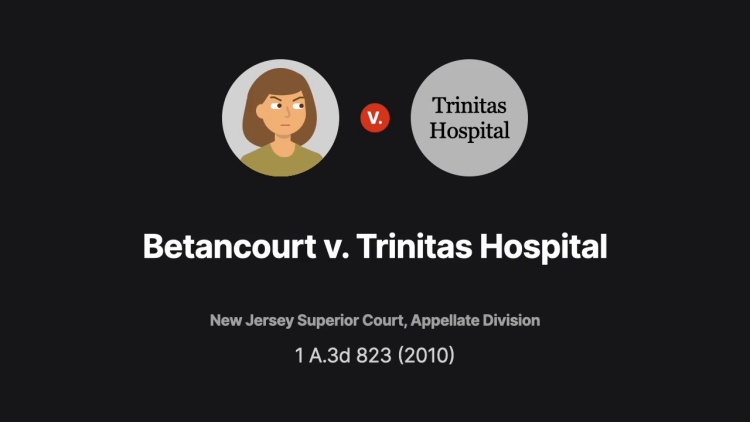Betancourt v. Trinitas Hospital
New Jersey Superior Court, Appellate Division
1 A.3d 823 (2010)
- Written by Craig Conway, LLM
Facts
Reuben Betancourt, a 73-year-old man, underwent surgery at Trinitas Hospital (Trinitas) (defendant) to remove a malignant tumor from his thymus gland. Although the surgery was successful, Betancourt’s ventilator tube became dislodged while he was recovering resulting in significant brain injury due to the prolonged oxygen deprivation. Consequently, Betancourt lapsed into a persistent vegetative state. Betancourt was completely unresponsive and being kept alive by a ventilator and other medical equipment. Repeated attempts at rehabilitating Betancourt failed. Trinitas physicians sought to obtain permission from Betancourt’s family (plaintiff) to place a Do Not Resuscitate (DNR) in Betancourt’s medical chart which would remove the life-sustaining treatment. The family refused. Thereafter, Trinitas acted unilaterally and placed the DNR order in Betancourt’s chart. The family filed suit against Trinitas to prevent the hospital from removing the life-sustaining treatment. After a trial, the court ordered Trinitas to re-establish the level of treatment that have been provided to Betancourt prior to the discontinuation of the life-sustaining treatment and appointed Betancourt’s daughter as surrogate to make medical decisions on behalf of Betancourt. Trinitas appealed. During the pendency of Trinitas’ appeal, Betancourt died. The family filed a motion to dismiss the suit as moot.
Rule of Law
Issue
Holding and Reasoning (Per curiam.)
What to do next…
Here's why 904,000 law students have relied on our case briefs:
- Written by law professors and practitioners, not other law students. 47,100 briefs, keyed to 995 casebooks. Top-notch customer support.
- The right amount of information, includes the facts, issues, rule of law, holding and reasoning, and any concurrences and dissents.
- Access in your classes, works on your mobile and tablet. Massive library of related video lessons and high quality multiple-choice questions.
- Easy to use, uniform format for every case brief. Written in plain English, not in legalese. Our briefs summarize and simplify; they don’t just repeat the court’s language.






